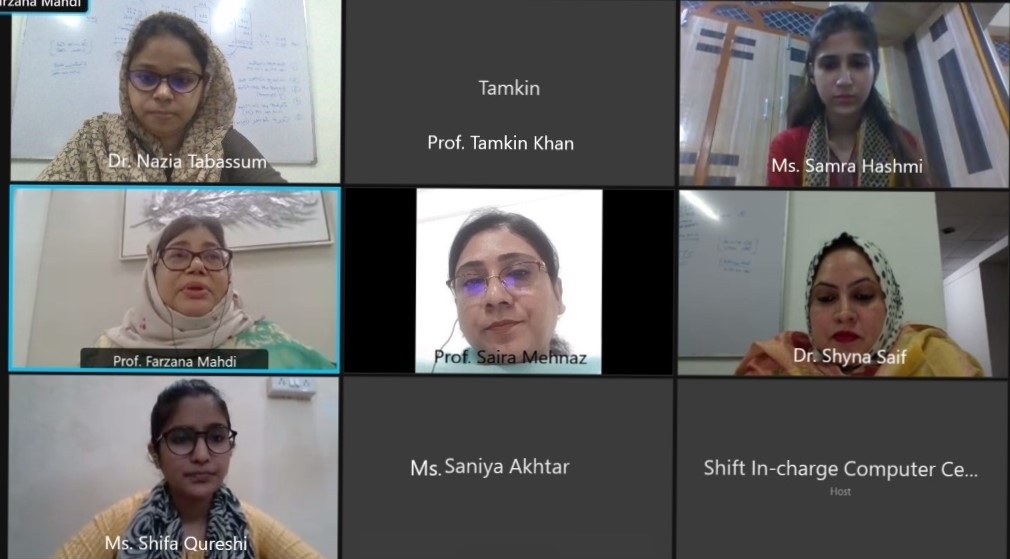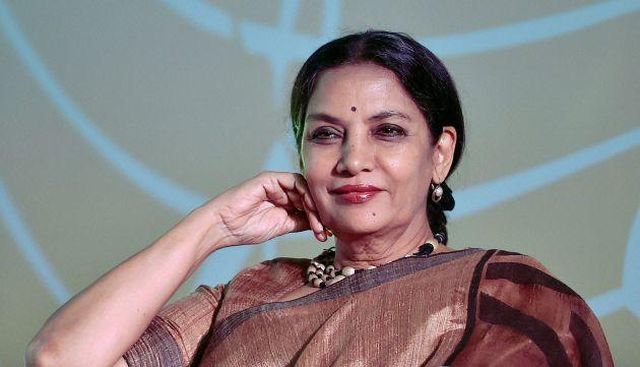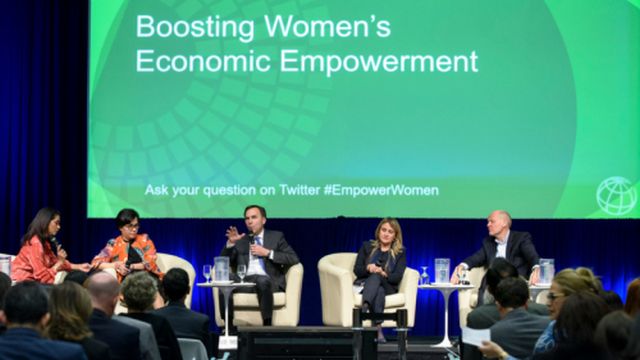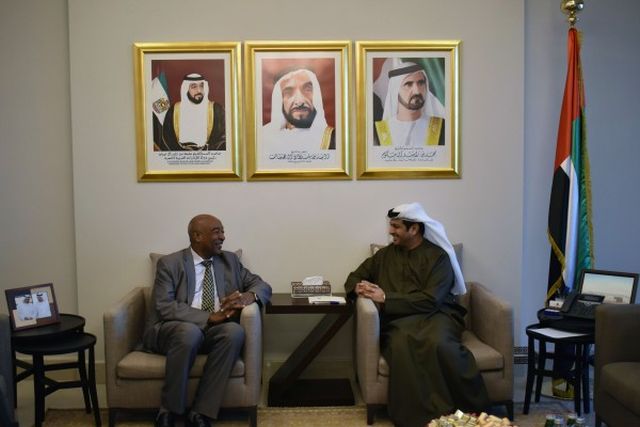
by Editor | Sep 3, 2021 | Entrepreneurship, Women Entrepreneur
Aligarh: Peerless experts and students discussed the remarkable all-round achievements of Indian women post-independence—why it is necessary to retrospect the journey of Indian women to date—and the need to scale up further progress in the webinar on ‘Women Empowerment in Post Independence Era: A Student’s perspective’ of the girls residential hostel, Begum Sultan Jahan (BSJ) Hall of Aligarh Muslim University (AMU).
Attending the programme to observe the Nation-wide ‘Azadi Ka Amrit Mohotsav, the Chief Guest, Professor Farzana Mahdi (Vice Chancellor, Era University, Lucknow) spoke on the significance of education and the need for striking a balance between women’s moral obligation, their duties and choices of free will and freedom.
“Women should not always be the epitome of sacrifice and submissiveness. They should have all the freedom to give priority to their wishes, needs, desires and ambitions”, she added.
Moderating the programme, Prof Tamkin Khan (Department of Obstetrics and Gynaecology) delineated women empowerment since independence and the necessity of bringing more reforms to ameliorate the living conditions of common women.
“Societies progress and develop when women are impartially provided with opportunities. Expectations and sacrifices should not only be expected from women. Gender roles must be specific as it is imperative to develop empathetic, healthy and compatible relations between men and women,” she stressed.
“There is no chance for the welfare of the world unless the condition of women is improved,” said Dr Saira Mehnaz, Professor of Community Medicine and BSJ Hall Provost.
Shedding light on different challenges faced by women and the need for their empowerment, Prof Saira pointed out that women must have full control over their actions, material assets, and intellectual resources and even over ideologies.
She also delivered the welcome address.
Dr Shyna Saif (Department of Social Work) elucidated how Begum Sultan Jahan, the first Chancellor of AMU and the first ever woman chancellor of a university in India paid particular attention to women’s education and emancipation.
“Begum Sultan Jahan went on to have a reign marked by commitment to progress, education and women’s health reforms. She authored 40 books and made great strides in infrastructure, architecture, arts and education at a time when the women were so severely deprived,” said Dr Shyna.
BA LLB students, Shifa Qureshi, Samra Hashmi and Saniya Akhtar spoke about women’s role and contribution throughout history and political and social empowerment of women.
They emphasised why women empowerment is required to be provided with independent roles in Indian society.
“Empowering women is a necessary right of women. They should have proportional rights to contribute to society, economics, education, and politics,” said the student speakers.
Dr Nazia Tabassum extended the vote of thanks.
Students, faculty members and all wardens of the BSJ Hall attended the online programme.

by admin | May 25, 2021 | Entrepreneurship, News, Social Entrepreneur, Success Stories, Women Entrepreneur

Shabana Azmi
New Delhi : Veteran actress and philanthropist Shabana Azmi, an active spokesperson for women empowerment, believes having women as leaders can bring about a change.
“Women leaders can change the world. When women have a seat at the table, they lend their unique perspective to policy decisions that impact them and their communities,” Shabana said in a statement.
She appreciated ‘Asmita-Woman’, a programme to be hosted by the Foundation for Management Research and Training (FMRT) here on September 30 to recognise the power of women and also to bring together some women who have made the change happen in society just by thinking different and being independent.
Shabana said that providing a platform to the women who have done something different for society is a much-needed step that has been taken by FMRT.
“Creativity becomes capacity when it brings light into the life of others,” said Jyoti Rana, Chairperson, FMRT.
Celebrated classical dancer Shovana Narayan will also be a part of the event.
Neharika Vohra, recipient of the Woman Achievers Award, said: “Women leaders should not be a topic for discussion in 21st century. However, given the shortage of women leaders across almost all sectors we need to figure out to have more of such leaders. Society, family, workplaces, all need to relook how they can support women to perform their best.”
Former beauty queen Shivani Wazir Pasrich, hockey star Mamta Kharab and motivational speaker Rashmi Bansal will be some of the speakers among others.
—IANS

by admin | May 25, 2021 | Interviews, World
 By Vishal Gulati,
By Vishal Gulati,
Da Nang (Vietnam) : Women everywhere still face everyday disadvantages. Empowering them will unlock new potential to tackle environmental challenges, President of the Marshall Islands, Hilda C. Heine, has said.
“The GEF (Global Environment Facility) has long emphasised on gender – still, every woman, especially in our Pacific nations, needs to walk the talk and make sure that they enjoy the same economic rights as men,” Heine, the first woman to lead an independent Pacific Island nation, told IANS in an interview.
Heine, who was elected President of the Marshall Islands in January 2016, was in this Vietnamese tourist resort city to address the GEF Assembly, the organisation’s highest governing body.
The assembly saw attendance of 1,200 delegates, including ministers and other representatives, from all its 183 member-countries, with bold commitments for action to avoid an environmental catastrophe.
“We have to keep working for gender-responsive government policies and programmes; decision-making and leadership; economic empowerment; ending violence against women, and ensuring effective education and sexual reproductive health services,” Heine contended.
She advocated that building capacity on gender equality also helps catalyse actions that have the potential to materialise greater environmental impact.
For Heine, the low-lying nations like hers are still grappling with an existential threat in the face of the growing global environmental crisis.
According to her, the GEF, the world’s foremost institution for financing environmental change, has given a billion dollars in grants to safeguard the environment.
“The work of GEF supporting developing countries with nationally-led emission reduction efforts and protection for millions of people vulnerable to climate change has saved lives and improved our chances for survival. Still we need a political momentum in tackling climate challenges,” a confident Heine said.
Around 50 heads of government will hold the world’s first-ever virtual summit on November 22 that Heine announced at the GEF Assembly.
The carbon-free summit will bring together leaders of the 48-nation Climate Vulnerable Forum (CVF), which represents many of the countries most threatened by climate change.
Heine, who will soon assume the chairmanship of the CVF, announced that the summit would be convened entirely online as a “Virtual Summit”, showcasing intentions to work in new and innovative ways and to build broader coalitions.
The summit was immediately acknowledged by global leaders like French President Emmanuel Macron and California Governor Edmund G. Brown Jr. Heine said it is a crucial step for helping to renew political momentum and awareness to enable the vulnerable to survive and thrive.
“Our summit will be showcasing our intensions to work in new and innovative ways and to build broader coalitions across society for the change we need.
“Small countries like mine are showing leadership through ambitious mitigation targets, we want every country to step up the ambition of their own NDCs (nationally determined contributions) if we are to stay within the 1.5 degrees Celsius temperature limit we set in Paris (in 2015),” she said.
“We are working hard to match our international engagements at the national level. Under our 2025 climate target, we have committed to a 32 percent reduction in emissions compared to 2010 levels, and we have already committed to bringing forward new and more ambitious target for 2030.”
The former Education Minister, whose country played a crucial role at the 2015 Paris climate summit, is confident that optimising tapping of renewable energy sources could help overcoming climate change mitigations.
Heine said GEF’s work supporting developing countries with nationally-led emission reduction efforts and protection for millions of people vulnerable to climate change has saved lives and improved chances for survival.
She praised GEF’s contribution to addressing chemicals and pollutants played a pivotal role in paving the way for a recovery of the ozone layer.
Describing the CVF summit as an important opportunity to accelerate action towards a low carbon future, GEF CEO and Chairperson Naoko Ishii said: “At this critical time, we all need to raise our climate ambitions and the GEF is committed to transformational change.”
“In its new four-year investment strategy, GEF puts a strong emphasis on financing for Least Developed Countries and Small Island Developing States,” she added.
The Sixth GEF Assembly, held once in four years, took place from June 27 to 28 here. It also saw the presence of President David Granger of Guyana and Prime Minister Nguyen Xuan Phu of Vietnam.
(Vishal Gulati was in Da Nang for the Internews’ Earth Journalism Network Biodiversity Fellowship Programme at the Sixth Global Environment Facility (GEF) Assembly. He can be reached at vishal.g@ians.in )
—IANS

by admin | May 25, 2021 | Entrepreneurship, Muslim World, Women Entrepreneur

(Image -Twitter / Sidhant Sibal)
New Delhi : Reforms in the traditional education system and empowering women are the two major agendas Morocco is following in its efforts to counter terrorism and radicalisation, a top diplomat of the North African nation has said.
“We still have the problem of dealing with the traditional education system,” Assia Ben Salah Alaoui, Ambassador at large for Moroccan King Mohammed VI said in a speech on “Morocco’s Security Strategy: Preventing Terrorism and Countering Extremism” organised by the Indian Council of World Affairs (ICWA) think tank here on Wednesday.
“We are trying to reform the system,” Alaoui said, adding that education is very important to shape young minds.
She said that families were being engaged to ensure that children were not radicalised at a young age.
She also pointed to her country’s empowering of women to engage in business.
Alaoui said that the idea that women and Islam are incompatible, just as democracy and Islam are incompatible, should be revoked.
“Women business organisations are being helped in our country,” she stated.
According to Aaloui, religion today has become a very minor factor in the radicalisation of people for terrorism.
She said that those being targeted were from poor and malnourished backgrounds and were being paid on a monthly basis by the terrorist organisations like the Islamic State.
She said that religion still retains a role in this global menace because of people in Europe.
“These people have lost touch with their culture. They do not know religion, they don’t know the origin of their culture,” the Ambassador stated. “The terrorists are promising them dreams of going to paradise.”
Aaloui said that in her country imams are being trained to propagate moderate Islam.
“In Morocco, we have created the Foundation of African Ulema that is working hard to spread moderate Islam.”
—IANS

by admin | May 25, 2021 | Muslim World
 Beirut : A UN official on Tuesday praised the efforts by the United Arab Emirates (UAE) in empowering Emirati women.
Beirut : A UN official on Tuesday praised the efforts by the United Arab Emirates (UAE) in empowering Emirati women.
Abdul Salam Sayed Ahmad, Regional Representative of the UN Human Rights Office of the High Commissioner in the Middle East and North Africa, praised the UAE for granting women their rights to become a key and effective partner in building the society.
Ahmad said the election of the UAE as a member of the UN Human Rights Council was a confirmation of the country’s efforts in promoting the principles of humanity.
His comments came during his meeting with Hamad Saeed Sultan Al Shamsi, the UAE Ambassador to Lebanon, where they discussed the extent of the UAE’s commitment to international treaties and conventions.
Ambassador Al Shamsi emphasised the country’s interest in the human rights field to make a positive impact on the global level through constructive action to support the implementation of the principles of the Universal Declaration of Human Rights.
He said that the UAE had taken an important step in this regard as its foreign policy pillars were based on the principles of justice, equality, respect for the rights of workers on its territory, as it attracts more than 200 nationalities.
—IANS/WAM





